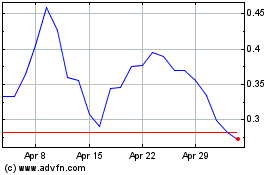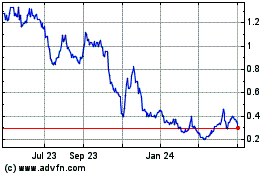Marshall Edwards, Inc. Commences Clinical Trial in Cervical Cancer at Yale
February 23 2004 - 8:23AM
PR Newswire (US)
Marshall Edwards, Inc. Commences Clinical Trial in Cervical Cancer
at Yale WASHINGTON, Feb. 23 /PRNewswire-FirstCall/ -- Marshall
Edwards, Inc. (London AIM: MSH) has commenced a new human clinical
trial of the investigational anti-cancer drug, phenoxodiol, in
patients with cancer of the cervix. The study of patients with
squamous cell carcinoma and adenocarcinoma of the cervix vagina and
vulva is being conducted at Yale-New Haven Hospital, Connecticut,
USA. The Principal Investigator is Dr. Masoud Azodi of the Yale
University School of Medicine. The subjects in the study will have
a primary diagnosis of cancer and after four weeks of daily
phenoxodiol treatment in its oral dosage form will be scheduled for
either surgical resection or radiotherapy. This design is known as
a neo-adjuvant study. The study will evaluate the safety and
ability of phenoxodiol to act as an effective anti-cancer agent
when it is given as a monotherapy in early-stage cancer. Because
this is the first study in the U.S. using phenoxodiol in its oral
dosage form, it is to be termed a Phase I trial. Phenoxodiol was
used in the intravenous dosage form, also at Yale, in the now
completed Phase II trial for chemo-resistant ovarian cancer.
Patients interested in learning more about the trial should contact
Renee Luongo at Yale University School of Medicine, 203-785-6956.
Marshall Edwards, Inc. is pursuing a dual strategy of developing
phenoxodiol for the treatment of both early-stage cancers and
late-stage cancers. The strategy in early-stage cancers of using
phenoxodiol as a monotherapy is intended to result in the killing
of cancer cells before they have had a chance to develop the
pro-survival techniques that characterize many late-stage cancers.
The strategy being employed for late-stage cancers is to use
phenoxodiol as a chemo-sensitizing agent in combination with
standard drugs. Pre-clinical studies have shown that phenoxodiol
potently synergizes the action of standard anti-cancer drugs such
as platinums, taxanes, gemcitabine and camptothecin, as well as
restoring sensitivity in chemo-resistant cancer cells. One of the
main ways in which phenoxodiol functions, is to inhibit the
production within the cancer cell of anti-apoptotic or pro-survival
proteins such as FLIP and XIAP. These are proteins produced by all
cells as a way of blocking the action of death receptors and
inhibiting apoptosis. Proteins such as XIAP are over-expressed in
many cancers as well as being associated with the development of
resistance to anti-cancer drugs. By inhibiting the production of
these blocking proteins, phenoxodiol restores the ability of the
cancer cell to undergo apoptosis, as well as restoring the ability
of cancer cells to respond to the killing effects of many standard
anti-cancer drugs. Dr. Graham Kelly, Executive Chairman of Marshall
Edwards, Inc., said, "by comparing the size and appearance of the
tumor at both the start and conclusion of the study, researchers
had the chance to document the anti-cancer effect of phenoxodiol in
a precise way. "Cervical cancer is a squamous cell carcinoma, which
is the main form of cancer found in tumors of the head, neck,
mouth, esophagus, cervix, vagina and bladder," Dr. Kelly said. The
study will involve 20women. Phenoxodiol will be given as an oral
capsule, three times per day, using two different dosages in order
to determine the dose-response effect. Phenoxodiol was developed by
Novogen Limited (NASDAQ:NVGN) (Australia: NRT) and licensed to
MarshallEdwards, Inc. It is an investigational anti- cancer drug
that has yet to receive marketing approval by regulatory
authorities. Statements included in this press release that are not
historical in nature are "forward-looking statements" within the
meaning of the "safe harbor" provisions of the Private Securities
Litigation Reform Act of 1995. You should be aware that our actual
results could differ materially from those contained in the
forward-looking statements, which are based on management's current
expectations and are subject to a number of risks and
uncertainties, including, but not limited to, our failure to
successfully commercialize our product candidates; costs and delays
in the development and/or FDA approval, or the failure to obtain
such approval, of our product candidates; uncertainties in clinical
trial results; our inability to maintain or enter into, and the
risks resulting from our dependence upon, collaboration or
contractual arrangements necessary for the development,
manufacture, commercialization, marketing, sales and distribution
of any products; competitive factors; our inability to protect our
patents or proprietary rights and obtain necessary rights to third
party patents and intellectual property to operate our business;
our inability to operate our business without infringing the
patents and proprietary rights of others; general economic
conditions; the failure of any products to gain market acceptance;
our inability to obtain any additional required financing;
technological changes; government regulation; changes in industry
practice; and one-time events. We do not intend to update any of
these factors or to publicly announce the results of any revisions
to these forward-looking statements. DATASOURCE: Marshall Edwards,
Inc. CONTACT: Australia: Christopher Naughton of Marshall Edwards,
Inc., +011-61-2-9878-0088; or USA: David Sheon, +1-202-518-6384,
for Marshall Edwards, Inc.
Copyright
Kazia Therapeutics (NASDAQ:KZIA)
Historical Stock Chart
From Jun 2024 to Jul 2024

Kazia Therapeutics (NASDAQ:KZIA)
Historical Stock Chart
From Jul 2023 to Jul 2024
